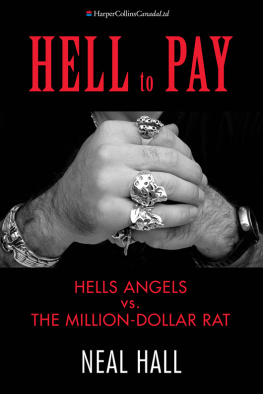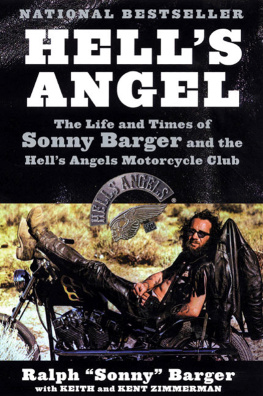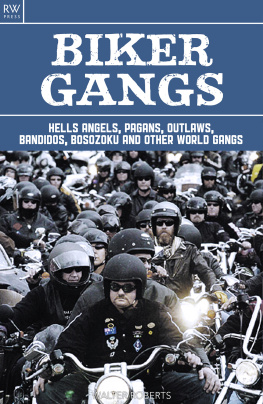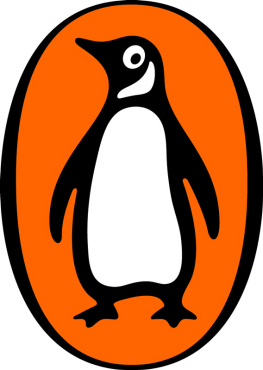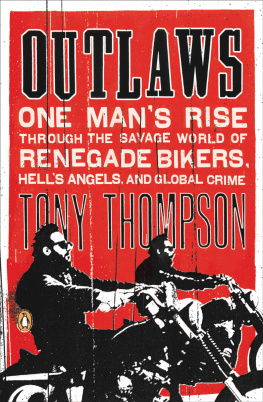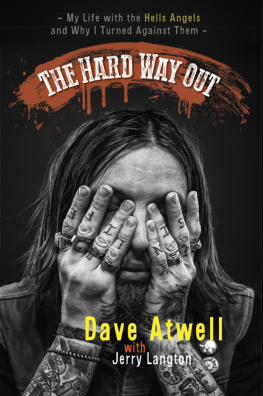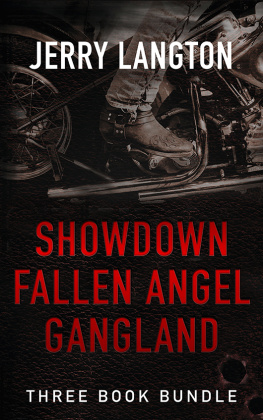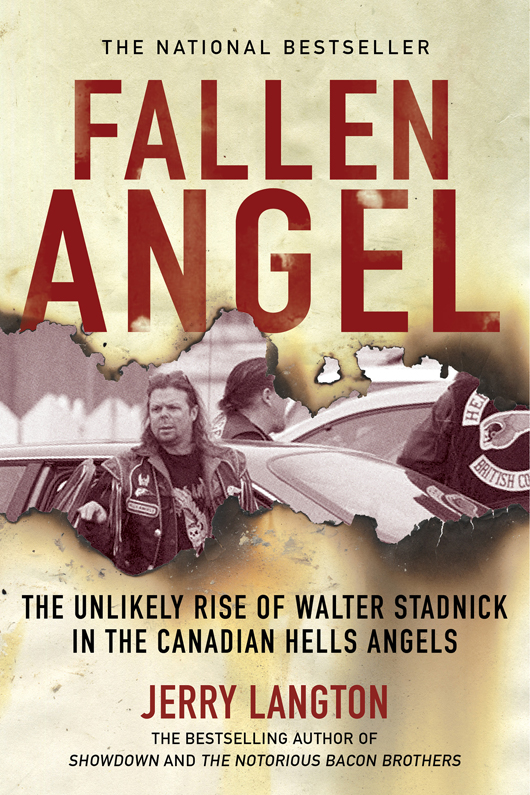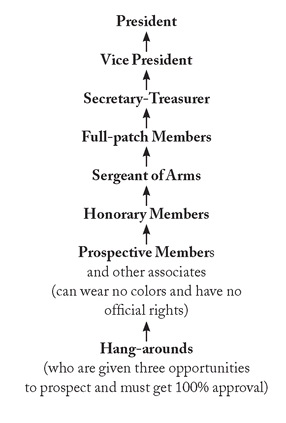Table of Contents
Fallen Angel
The Unlikely Rise of Walter Stadnick in the Canadian Hells Angels
Jerry Langton
Structure of Hells Angels Outlaw Motorcyle Gang
Acknowledgements
Fallen Angel is a collaborative effort. It is the combined voices of dozens of police officers, bikers, lawyers, drug dealers, journalists, neighbors, politicians and all kinds of other people who had something to say. For reasons that are obvious, a significant proportion of them would rather I didnt use their names. They are the peoplelike Diane the nurse, Bob the cop and Vincent the, to use his own phrase, wealth redistributorwho are referred to by first name only and not always their real first name. Others are referred to by no name at all if their connection to the story requires no further context. Of course, some of my sources had agendas to push and some werent always honest. There were times when two people would claim the exact opposite of each other with equal stridency. In those cases, I had to find the answer somewhere else or not at all.
Of the people who are named, there were some that I consider truly essential. Sergeant John Harris of the Hamilton Police Service rose above all others. His knowledge of crime in his city and the entire country is extraordinary and he delivers it all in such a wittily matter-of-fact way that I sometimes think he should be the one writing the books. Similarly, his fellow sergeant in Hamilton, Steve Pacey, added a remarkable amount of drama as the man who went face-to-face with the bikers so many times and was the one who exposed so much of the inner workings of the Hells Angels when he searched Stadnicks home. They may have been given the job of ridding the streets of outlaw bikers, but they both clearly understood that their adversariesespecially Stadnickwere people with rights and dignity and real, sometimes very deep, personalities. If theres a hero to this story from a law-enforcement perspective, its Quebec prosecutor Randall Richmond. A man of courage, conviction and staggering intellect, he stood firm and repeatedly did his job brilliantly under bizarre conditions.
I could not have written much of anything without the people on the street who, through drug sales, drug use or simply hanging out in certain parts of certain cities and towns, gave me a perspective with more depth and color than I could have gotten from police and prosecutors. Thanks go to people like Brian and Mike and others who werent entirely sure that being a Hells Angel was all that bad an occupation and kept reminding me that its not us against them.
Many thanks also go to the great Leta Potter people and the folks at John Wiley & Sons Canada, especially to Don Loney for the pep talks at The Pour House pub. Thanks also to Eric in the Bronx for his research and perspective, to Mark for his constant guidance and mockery, and to Karen, who read the last few thousand words and shook me from my deeply held opinion that I am the worst writer in the world. And, of course, deepest thanks go to Tizz, Dida and the H-Dogg, the collective reason I do anything.
Introduction
Its hard to tell what people think of your book. When the first edition of Fallen Angel came out last March, it received quite a bit of attention. There were some good reviews in some major newspapers (there was also one bad one, but I was told its writer had his own issues on the subject) and sales were much better than expected. It also received a lot of attention on radio and TV, although this could well have been because its release virtually coincided with teh Shedden Massacrean incident in which eight members of the Bandidos motorcycle gang were executed then dumped in a farmers field in southwestern Ontario. The images, particularly the giant white belly of a dead biker hanging out of the back of a Nissan Murano SUV, were everywhere and people wanted to know more. Because of the renewed interest in bikers, I was on TV and radio regularly. While some pretty impressive people, like CTVs Mutsumi Takahashi and Globals Robin Gill, had told me they were impressed by the book, just as many interviewers made it clear (some almost proudly) that they hadnt read it and didnt ever intend to. Worse yet, I didnt run into anyone I knew who didnt make a joke about how I arranged for the Shedden Massacre to boost sales.
At the height of the media interest in bikers, I was killing time in Hamilton between two interviews and wandered into a bookstore in Jackson Square, the big mall downtown. I was curious to see if they had any copies of the book. When I didnt find any, I asked the clerk. Oh, were sold out of that, she told me. And we dont put it on the shelves anymoreas soon as we put them out, people would steal themwe have to keep them behind the counter. Im not sure if I hit my target audience, but it made me strangely proud.
It was a tough book to write in the first place and a project I took with some anxiety. Looking for help and maybe a little inspiration, I called Daniel Sanger. Hed just written Hells Witness, an excellent book that follows the career of Dany Kane, the biker informant who played a significant role in the rise and fall of the Hells Angels in Canada, and it was clear he knew what he was talking about. When I told him that Fallen Angel would be in large part about Walter Stadnick, he was mildly surprised. Great subject matter, he said. But youve got a lot of work in front of you.
Indeed I did. By all accounts, Stadnick is an extremely intelligent and capable man who excels at nothing better than keeping out of trouble. In the same period his notorious colleague Maurice Mom Boucher was convicted of 43 times, Stadnick received two traffic tickets. Of course he was arrested a couple of times, but could not be convicted until 2004, more than 20 years after he is said to have joined the Hells Angels. Every single one of the police officers, lawyers, politicians and journalists I spoke with were of the same opinionthat Stadnick was the man who built the Canadian Hells Angels from a bunch of cocaine-crazed louts on bikes in Montreal to the biggest, strongest and most efficient crime organization in the country. But none of them knew how or why. They all knew a part of the story and were eager to tell me their little bit. Putting it together, as Sanger told me, would be the hard part.
But Fallen Angel is not a biography of Walter Stadnick. If it was, it wouldnt do him justice. In Fallen Angel, the story of a remarkably complex and secretive man is just an allegory for the bigger picture. He was smart and charismatic, but he came of age in a time and place where his talents werent worth much. When he started gainng money and popularity through being a biker, he knew hed found his niche. He moved up through the minor leagues to the big time. Although he was tiny by biker standards and couldnt speak any French, he went to the Hells Angels clubhouse in Montreal, and before too long, he was their president. Stadnick traveled the country using charm and persuasion to sign up other men and other clubs, until his gang ruled the bikers from coast to coast.
He then formed a new gang, the Nomads, who told the Hells Angels what to do. He did it all by staying a few steps ahead of the police and staying out of trouble. His story mirrors that of the Hells Angels, who started out small and without direction and quickly gained enough momentum to dominate organized crime in this country.


